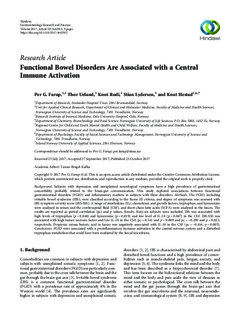Functional Bowel Disorders Are Associated with a Central Immune Activation
Journal article, Peer reviewed
Published version

Åpne
Permanent lenke
http://hdl.handle.net/11250/2479563Utgivelsesdato
2017Metadata
Vis full innførselSamlinger
- Institutt for psykologi [3105]
- Publikasjoner fra CRIStin - NTNU [38228]
Sammendrag
Background. Subjects with depression and unexplained neurological symptoms have a high prevalence of gastrointestinal comorbidity probably related to the brain-gut communication. This study explored associations between functional gastrointestinal disorders (FGID) and inflammatory markers in subjects with these disorders. Methods. The FGID, including irritable bowel syndrome (IBS), were classified according to the Rome III criteria, and degree of symptoms was assessed with IBS symptom severity score (IBS-SSS). A range of interleukins (IL), chemokines and growth factors, tryptophan, and kynurenine were analysed in serum and the cerebrospinal fluid (CSF), and short-chain fatty acids (SCFA) were analysed in the faeces. The results are reported as partial correlation (pc) and values. Results. Sixty-six subjects were included. IBS was associated with high levels of tryptophan () and kynurenine () and low level of IL-10 () in the CSF. IBS-SSS was associated with high tumor necrosis factor and low IL-10 in the CSF; and and and , respectively. Propionic minus butyric acid in faeces was negatively associated with IL-10 in the CSF (, ). Conclusions. FGID were associated with a proinflammatory immune activation in the central nervous system and a disturbed tryptophan metabolism that could have been mediated by the faecal microbiota
